|
Getting your Trinity Audio player ready...
|
A question has been raised since the beginning of the fighting in Ukraine on February 24, 2022: if the government were to fall, would Western states support an irregular war against a potential pro-Kremlin regime? The conflict in Ukraine began via Russian material aid to pro-Russian insurgents in eastern Ukraine in 2014. Would the situation be reversed, this time with U.S. and European state aid to pro-Ukrainian rebels?
Proxy warfare through support for irregular forces remains one of the most direct ways in which two states can confront each other without engaging their respective armies in combat. This article first examines the benefits and risks to states of providing material support to insurgent groups, focusing not on the content of the assistance – the type of resources provided to rebels – but on the form of the assistance – whether it is covert or overt. The article then presents descriptive data on the prevalence of clandestine/public state support to insurgents between 1989 and 2018.
The Benefits of Covertness
In this article, state sponsors include countries that provide material resources – arms, money, humanitarian resources, and/or other logistical assistance – to rebel organizations fighting in civil wars against target states: the governments of the territories in which they operate. The Uppsala Conflict Data Program (UCDP) defines an active civil war as an armed opposition resulting in at least 25 casualties in a calendar year.
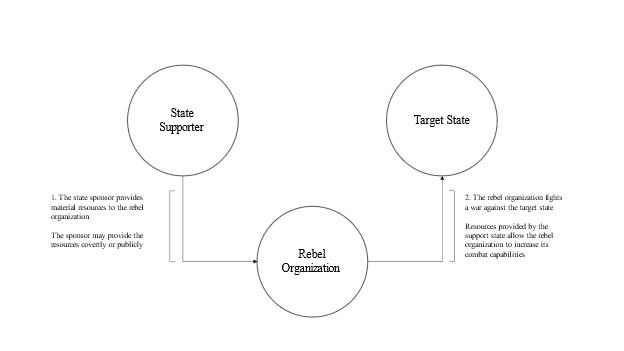
The assistance provided to rebels can be either covert – political leaders of the country assisting the rebels do not acknowledge or even deny the support in the public arena – or public – political leaders of the country assisting the rebels recognize and/or justify their support in official discourses. A cursory review of international relations research shows that several specific advantages may first drive states to opt for secrecy when supporting insurgent groups on the territory of another state.
The first advantage of clandestinity is plausible deniability. Acting covertly, without overt claims by political representatives, allows state supporters to control information. The deniability enables them to maximize control over a potential conventional military escalation with the target state. Supporting rebels on the territory of another state is, in effect, a highly confrontational action against a rival government. The target state may respond with conventional or irregular military means to the government supporting insurgents. Supporting states that do not publicly admit to supporting the rebels can hope to avoid detection of their actions by their rivals and thus limit any risk of military retaliation by the target states. Controlling military escalation is particularly important when it comes to nuclear state power confrontations.
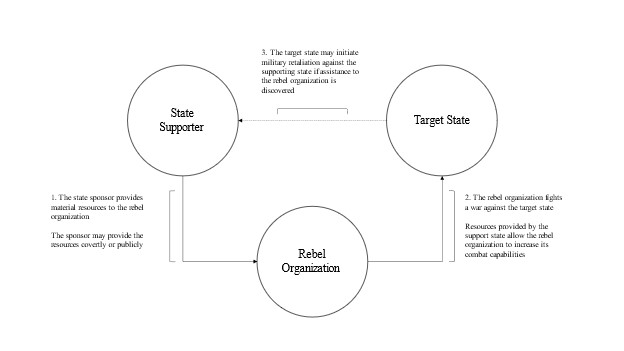
Denial is sometimes more critical than absolute secrecy. Even if the target state learns of the existence of military support to rebels intended to fight it, it is not uncommon for it to prefer to keep this information secret in cases where the sponsors act clandestinely. In a recent book, Austin Carson studied this situation, which may seem counter-intuitive. The researcher shows that, even when detected, a target state can have no interest in publicly revealing an adversary’s clandestine belligerent support on its territory. Reacting publicly would require the target state to retaliate militarily against the support state not to appear weak to its internal political class, especially the opposition parties, and to public opinion. As a result, the risk of military escalation between the supporter and target states would become significant, which is not necessarily in the immediate interest of the targeted government. Carson highlights this phenomenon during the Spanish and Vietnam Wars and, more recently, during the Iraq War. In the latter case, the United States – the target state – knew that Iran – the supporter state – was materially supporting Shiite organizations fighting against U.S. forces. However, U.S. leaders did not immediately reveal the information to maintain complete control over the response to the Iranian affront, without internal constraints related to domestic opposition and public opinion forcing the country to engage in massive retaliation against Iran. Thus, even implausible deniability may serve state supporters’ interest in limiting the risk of military escalation with the targeted government.
The clandestine nature of support for insurgent organizations, on the other hand, can be particularly attractive to state sponsors when it is difficult for them to maintain close control over the actions of supported insurgents after they transfer resources. It is not uncommon for state-supported rebel organizations to commit varying degrees of violence against civilians. Public association with violent groups can severely damage a state sponsor’s reputation and, in some cases, expose it to binding international sanctions. Denying support to armed groups abroad allows a state to avoid potential negative consequences if the supported group uses the resources to commit abuses on the battlefield.
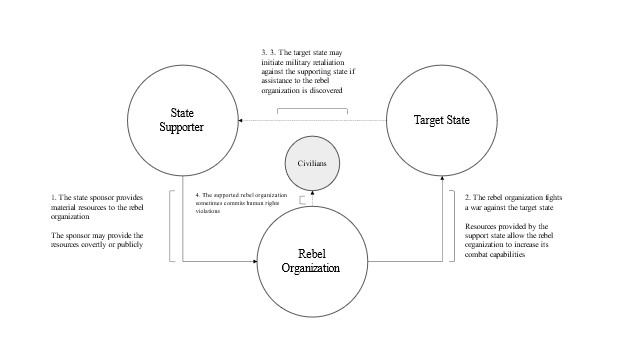
The Benefits of Overtness
While clandestine support for rebel groups has definite advantages for state sponsors, particularly in terms of maximizing control over the potential negative consequences of assistance, there are sometimes advantages that can persuade states to publicize, through formal recognition, their assistance to insurgents. The first advantage is tactical. Operating openly means acting more freely. While secrecy requires specific logistics to avoid discovery of the assistance provided, publicity allows a government to avoid such practical considerations. A publicly intervening state can transfer more and better resources to rebels, especially regarding technology. Moreover, acting openly facilitates the transfer of expertise to the rebels in using complex weapons, often through training conducted within the supporting states or third countries. In turn, the transfer of more resources, and more effective equipment, maximizes the chances of success for the supported insurgents. The supporting state acting publicly is more likely to achieve its strategic objectives in a conflict. Public, rather than clandestine, support enabled the United States to provide Stinger missiles and associated training to Afghan rebels in the late 1980s, significantly increasing the military efficacy of the insurgency. A link between the content and form of assistance to the rebels emerges here: covertness poses constraints regarding what sponsors can transfer, while publicity offers freedom of action for state sponsors.
In addition to the strategic advantages outlined above, acting openly offers supporting governments undeniable communicational advantages. It is sometimes beneficial for a state, especially in domestic politics, to publicly support a rebellion with which a large part of its national population shares a particular social identity, whether ethnic or religious. Iran’s public support for Hamas is just one example of this communicative process. Supporting a rebellion engaged in an armed struggle against a repressive state also allows a supportive government to communicate its position vis-à-vis that regime. Public action also carries a political message.
Thus, while acting covertly allows a supporting state to maximize control over potential negative consequences of its assistance to insurgents and thus limit potential military escalation, publicly supporting rebels abroad often maximizes the effectiveness of the action – and the attribution of any rebellion’s success to the support provided by the external government. Any state wishing to intervene indirectly in an armed conflict via material support to rebels has to prioritize control over the potentially adverse effects of its assistance or the weakening, or even defeat, of the target state. Related ethical and legal issues not addressed here also arise for state supporters.
The Prevalence of Covertness/Overtness in the Post-Cold War Period
In an article published in the European Journal of International Relations, I estimate the prevalence of covertness/publicity concerning state support for rebel groups across civil wars from 1989 to 2018. These figures rely on current knowledge of material support to rebel groups, including that provided by the Uppsala Conflict Data Program (UCDP). However, it is very likely that, due to extreme secrecy, some cases of material support are unknown. Therefore, the estimates are imperfect and subject to change as historical studies reveal new cases of state support to rebel groups.
The first observable result is that, based on current knowledge, publicity of support remains an exception within international politics. As illustrated below, most material support cases to rebel groups correspond to assistance provided clandestinely.
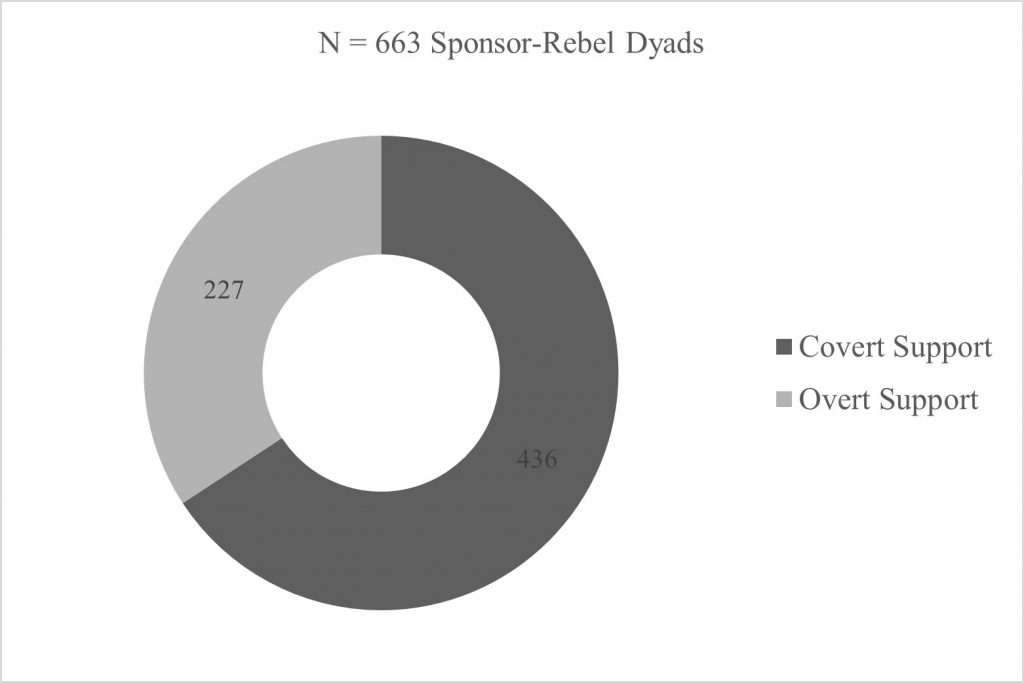
The desire to control potential negative consequences of support seems, in most cases, to outweigh the potential tactical and communicational benefits of publicizing support. The second chart below disaggregates the data by year to highlight potential temporal shifts in the secrecy or publicity of state support for rebel groups.
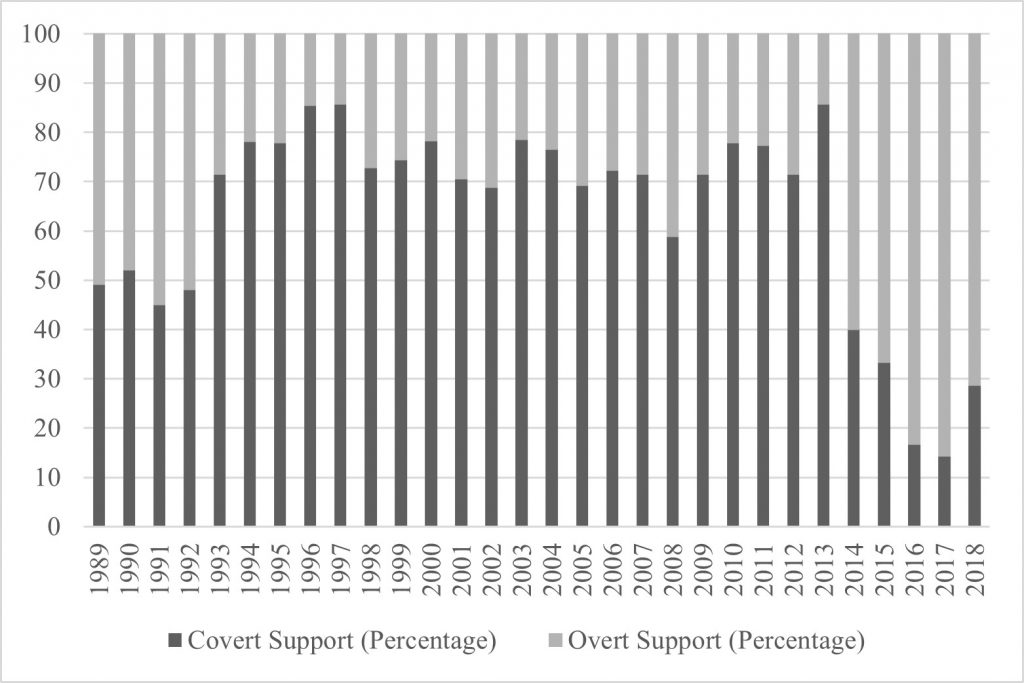
Three distinct temporalities appear from 1989 to 2018. The period before 1992 seems particularly prone to publicity of state support for rebels. One potential explanation is that, in the context of the end of the Cold War, states from both major blocs used publicity during this time to signal the credibility of their political and technological systems. For example, the United States openly supported the mujahideen engaged against the Soviets in Afghanistan.
The period 1993-2013, on the other hand, appears less prone to publicizing support for insurgent groups. The majority of rebels receiving external material support did so in a clandestine manner. This likely reflects an emerging international system based on norms of non-intervention, which causes many states to deny their involvement in the internal affairs of other states.
Finally, the period beginning in 2014 is marked by a return of publicity as a preferred policy tool in international politics. This trend potentially reflects a resurgence of strategic competition among great powers, particularly in significant conflicts such as Syria. The United States and many other countries, for example, openly support the Free Syrian Army engaged against the regime of Bashar Al-Assad, which Russia openly supported.
Conclusion: A Question to Consider
When I wrote this article, the Ukrainian army defeated the Russian army in the Kyiv region. Its withdrawal has revealed the massacres carried out against civilians. The battle for control of the Donbas is underway, and its outcome will determine the course of the war in the coming months and years. Suppose the question of aid to a possible rebellion against a pro-Russian regime, particularly in certain Ukrainian regions, is to be raised one day. In that case, the supporting states will have to ask themselves the question of the publicity of the support. Whether to maximize control over a potential escalation versus the effectiveness of the fight against a possible pro-Russian government and its sponsor in the Kremlin will inevitably arise. The success of the insurgency will depend heavily on this decision.
The original version of this text was published in French on Le Rubicon. Check it out here!

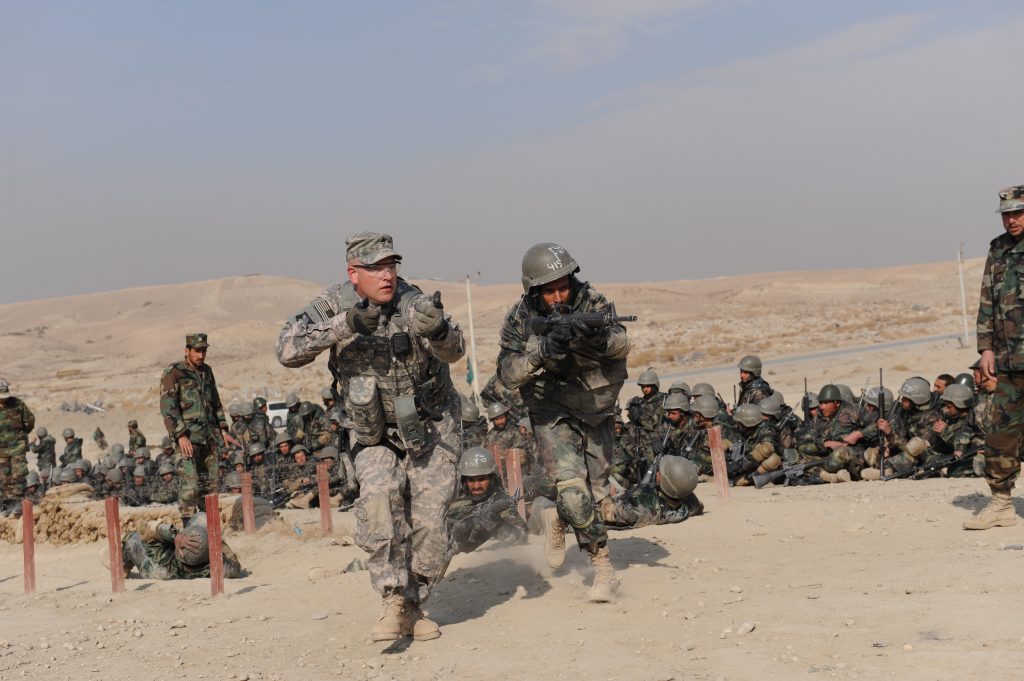



Comments are closed.